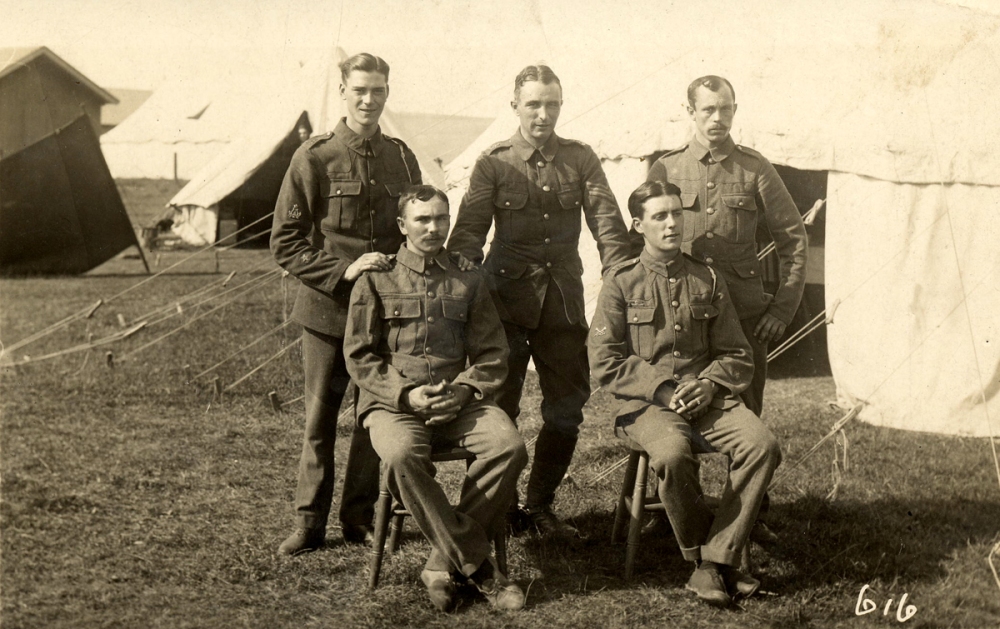…No more soldiering for me
When I get my civvy clothes on
Oh how happy I shall be
No more church parades on Sunday
No more putting in for leave
I shall kiss the Sergeant Major
How I’ll miss him, how he’ll grieve.
(traditional)
When I have published this photograph previously I have concentrated on the faces, there is such a wide variation of emotion. This time I have reproduced the entire postcard because there is some interesting detail, including the the old-fashioned guy ropes and the nosey private poking his head out from one of the tents. Judging by the shoelaces on the front row it was a rush job, so maybe some of those expressions are prompted by irritation.
I am guessing this is my maternal grandfather, Fred (seated on the right with a cigarette in hand), when he was still in the Territorial Army, before his dispatch to Gallipoli in January 1915. I have no record of how long he was posted there but by late 1915 he was at the RFC Training School, Aboukir in Egypt where he would stay until January 1919, rising to the rank of Chief Mechanic.
This demobilization account shows he was granted 50 months of War Gratuity up to 18th February 1919 when he was finally dispersed from Fovant Camp in Wiltshire. There is some fascinating detail on this aged piece of bureaucracy:
- The daily wage is seven shillings, almost a third being sent home to the dependant, in this case, Fred’s mum and dad;
- On dispersal he is granted 28 days leave in arrears at the rate of five shillings per day, a ration allowance and money for a set of ‘plain clothes’ – is this the suit he is proudly wearing in this post?
- He walked out of Fovant with £2 in his pocket and two postal drafts – his identity paper shows that these were cashed at his home town of Andover on the 1st and 11th March 1919 respectively – his Savings Bank Book was issued on 26th March 1919.
In the midst of the small print and the cumbersome administration is perhaps the most telling of all mean-spirited statements: The Service Gratuity of £1 per annum is not payable in addition to the War Gratuity. They had evidently not done enough to deserve it.


Wonderful photo and I loved seeing the other image and story of your grandfather as well.
I was in Canakkale just a week ago by strange fortune – certainly a kinder fortune than that of our forebears. There was a fascinating AV display of the Sea Battle of the Dardanelles at the Maritime Museum which led to the even more disastrous Anzac landing (from our perspective.)
That hard fought over and determinedly defended tiny strip of water and tiny strip of land. So hard to fathom today as the ferries zip back and forth in less time than it takes to buy and eat an ice-cream.
I think you have hit on the essence of it Chas – when you see the places that were being fought over you can’t help but ‘what for’. There is a quote from Don McCullin in an earlier post (Brothers in Arms) which says the same thing – “Years later I went back to Hué…..It seemed so inconsequential, the whole thing…..those men who died, and those men who were maimed for life, went through all that, and it was totally futile”
Love the vintage photobomb from the guy in the tent. 🙂
Here is a terrible admission – I have had that photo for decades and it was only yesterday I spotted the photobomb – unobservant or what 😦
Interesting post, Robin. Somewhat coincides with mine!
That was a well-timed coincidence – I read your post with great interest. You have inspired me to dig deeper re Fred’s time in the TA at Gallipoli. Incidentally, I never reveal my mother’s maiden name as it is often used as an online id reference for banking etc – I wonder if I am being too cautious.
Thank you so much for sharing! These photos are precious.
Yes, just bits of paper but as you say, very precious – many thanks for stopping by.
So personal and meaningful…..thanks for sharing this and your thoughts.
Thanks Madelaine – I am very proud of my grandfather
Wonderful artifacts and thoughts to pass on; we all need to remember…
Thanks Theresa – next year will be very significant.